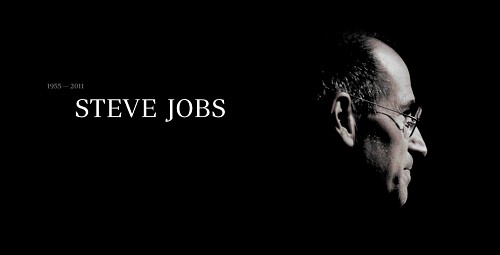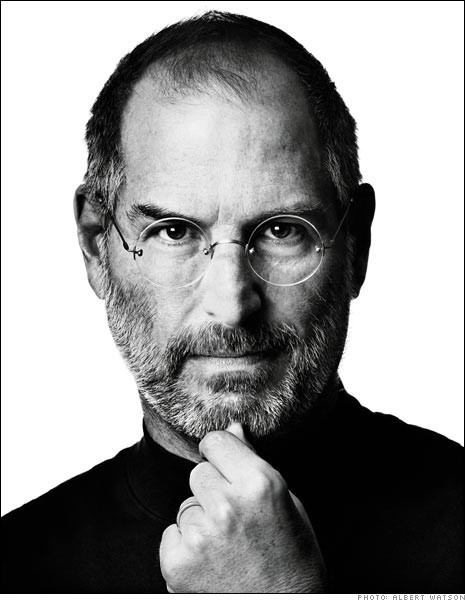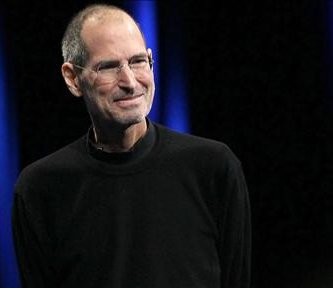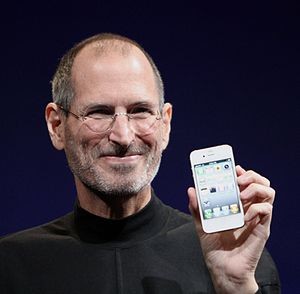Apple co-founder, Chairman Steve Jobs dies
Few months back i got a book from lci named steve jobs way iLeadership for a New Generation ,a great book.
Steven P. Jobs, the Apple Inc. chairman and co-founder who pioneered the personal-computer industry and changed the way people think about technology, died Wednesday at the age of 56.
His family, in a statement released by Apple, said Mr. Jobs "died peacefully today surrounded by his family."
The company didn't specify the cause of death. Mr. Jobs had battled pancreatic cancer and several years ago received a liver transplant. In August, Mr. Jobs stepped down as chief executive, handing the reins to longtime deputy Tim Cook.

"Apple has lost a visionary and creative genius, and the world has lost an amazing human being," Mr. Cook said in a letter to employees. "We will honor his memory by dedicating ourselves to continuing the work he loved so much."
During his more than three-decade career, Mr. Jobs transformed
"The world rarely sees someone who has had the profound impact Steve has had, the effects of which will be felt for many generations to come," Mr. Gates said in a statement Wednesday.
The most productive chapter in Mr. Jobs's career occurred near the end of his life, when a nearly unbroken string of successful products like the iPod, iPhone and iPad changed the PC, electronics and digital-media industries. The way he marketed and sold those products through savvy advertising campaigns and Apple's retail stores helped turn the company into a pop-culture phenomenon.
At the beginning of that phase, Mr. Jobs described his philosophy as trying to make products that were at "the intersection of art and technology." In doing so, he turned Apple into the world's most valuable company with a market value of $350 billion.
After losing considerable weight in mid-2008, Mr. Jobs took a nearly six-month medical leave of absence in 2009, during which he received a liver transplant. He took another medical leave of absence in mid-January, without explanation, before stepping down as CEO.
Mr. Jobs is survived by his wife, Laurene, and four children.
Mr. Jobs turned Apple into the largest retailer of music and helped popularize computer-animated films as the financier and CEO of Pixar Animation Studios, which he later sold to Walt Disney Co. He was a key figure in changing the way people used the Internet and how they listened to music, watched TV shows and movies, and read books, disrupting industries in the process.

"Despite all he accomplished, it feels like he was just getting started," Disney CEO Robert Iger said in a statement Wednesday.
Mr. Jobs pulled off a remarkable business comeback, returning to Apple after an 11-year absence during which he was largely written off as a has-been. He went on to revive the struggling company by introducing products such as the iMac all-in-one computer, iPod music player and iTunes digital-music store.
Beyond PCs
Apple now produces $65.2 billion a year in revenue compared with $7.1 billion in its business year ended September 1997. Apple dropped the "computer" in its name in January 2007 to underscore its expansion beyond PCs.
Although Mr. Jobs officially handed over the reins of the company to Mr. Cook, his death nevertheless raises a question for Apple of how it will sustain its success without his vision and guidance. Other companies, including Walt Disney, Wal-Mart Stores Inc. and International Business Machines Corp., experienced some transitional woes before eventually managing to thrive after their charismatic founders passed on.
But few companies of that stature have shown such an acute dependence on their founder, or have lost the founder at the peak of his career. Several years after Mr. Jobs was fired from Apple in 1985, the company began a steady decline that saw it drift to the margins of the computer industry. That slide was reversed only after Mr. Jobs returned in 1997.
Mr. Jobs also leaves behind many tales about his mercurial management style, such as his habit of calling employees or their ideas "dumb" when he didn't like something. He was even more combative against foes like Microsoft, Google Inc., and Amazon.com Inc. When Adobe Systems Inc. waged a campaign against Apple for not supporting Adobe's Flash video format on its iPhones and iPads in April 2010, Mr. Jobs wrote a 1,600-word essay about why the software was outdated and inadequate for mobile devices.
He maintained uncompromising standards for the company's hardware and software, demanding "insanely great" aesthetics and ease of use from the moment a shopper walked into one of Apple's stores. His attention to detail shaped some of the distinctive features of Apple's products.
Mr. Jobs enforced strict secrecy among employees, a strategy that he believed heightened anticipation for new products. News of his death came a day after Apple unveiled its newest device, the iPhone 4S, without him on stage.
Mr. Jobs, the adopted son of a family in
The pair came out with the Apple II in 1977, a computer that was relatively affordable and designed for the mass market rather than for hobbyists. It went on to become one of the first commercially successful PCs, making the company $117 million in annual sales by the time of Apple's initial public offering in 1980. The IPO instantly made Mr. Jobs a multimillionaire.
Not all of Mr. Jobs's early ideas paid off. The Apple III and Lisa computers that debuted in 1980 and 1983 were flops. But the distinctive all-in-one Macintosh—foreshadowed in a TV ad inspired by George Orwell's novel "1984" that famously only aired once—would set the standard for the design of modern computer operating systems.
Even then, Mr. Jobs was a stickler for design details. Bruce Tognazzini, a former user-interface expert at Apple who joined the company in 1978, once said that Mr. Jobs was adamant that the keyboard not include "up," "down," "right," and "left" keys that allow users to move the cursor around their computer screens.
Cultivated Image
Mr. Jobs's pursuit of aesthetics sometimes bordered on the extreme. George Crow, an Apple engineer in the 1980s and again from 1998 to 2005, recalls how Mr. Jobs wanted to make even the inside of computers attractive. On the original Macintosh PC, Mr. Crow says Mr. Jobs wanted the internal wiring to be in the colors of Apple's early rainbow logo. Mr. Crow says he persuaded Mr. Jobs it was an unnecessary expense.
Even in his appearance, Mr. Jobs seemed to cultivate an image more like that of an artist than a corporate executive. In public, he rarely deviated from an outfit consisting of Levi's jeans, a black mock turtleneck and New Balance running shoes.
As Apple expanded, Mr. Jobs decided to bring in a more experienced manager to lead the company. He recruited John Sculley from PepsiCo Inc. to be Apple CEO in 1983, overcoming Mr. Sculley's initial reluctance by asking the executive if he just wanted to sell "sugar water to kids" or help change the world.
After Apple fell into a subsequent slump, a leadership struggle led to a board decision to back Mr. Sculley and fire Mr. Jobs two years later at the age of 30. "What can I say—I hired the wrong guy," Mr. Jobs brooded in a PBS documentary. "He destroyed everything I had spent 10 years working for."
Mr. Jobs then created NeXT Inc., a start-up that in 1988 introduced a black desktop computer with advanced software. The machine suffered from a high price and some key design decisions. But its operating system would eventually become a foundation for OS X, the software backbone of today's Macs, after Apple purchased NeXT for $400 million in December 1996.
In 1986, using part of his fortune from Apple, Mr. Jobs paid filmmaker George Lucas $10 million to acquire the computer-graphics division of Lucasfilm Ltd. The company Mr. Jobs formed from that purchase, Pixar Animation Studios, went on to create a string of computer-animated film hits, such as "Toy Story." Mr. Jobs sold Pixar to Disney in 2006 in a $7.4 billion deal.
In Mr. Jobs's absence, Apple began foundering, and computers using Intel chips and Microsoft software became increasingly dominant. By 1997, Apple had racked up nearly $2 billion in losses in two years, its shares were at record lows and it was on its third CEO—Gil Amelio—in four years.
Eight months after the deal to buy NeXT in December 1996, Mr. Amelio was ousted and Mr. Jobs appointed interim CEO, a title that became permanent in January 2000. One former Apple employee recalls Mr. Jobs joking soon after he returned that "the lunatics have taken over the asylum and we can do anything we want."
Series of Stumbles
Mr. Jobs, who was given a salary of $1 a year along with options to Apple stock, made a series of changes. He killed the struggling
In May 1998, he introduced the iMac, an unusual one-piece computer that sported a colorful translucent case. Apple launched an ad campaign featuring the phrase "Think Different," featuring photographs of creative individuals including Albert Einstein and Muppets creator Jim Henson.
While shareholders cheered the changes, Mr. Jobs flexed his power on Apple's
Apple had stumbles during Mr. Jobs's second stint, including a cube-shaped Macintosh that failed to catch on and was scrapped in 2001. The failure was one reason Apple posted a quarterly loss and warned it would miss estimates several times in 2000 and 2001.
But big hits followed. In 2001, Apple introduced the iPod, which transformed digital music players. Apple has more than 70% market share in the market.
A key advantage was the iTunes Music Store, opened in 2003. Mr. Jobs helped persuade major record labels to sell recordings for 99 cents each. The store, which has sold more than 16 billion songs, became an incentive for people to buy iPods because, for much of its history, songs from the iTunes store could be downloaded only to Apple's music player.
Bench of Executives
At the same time, Mr. Jobs was building his bench of executives. He recruited Mr. Cook, a former Compaq Computer Corp. executive, in the late 1990s to straighten Apple's operations and promoted him over time to chief operating officer.
In 2004, Mr. Jobs had to lean on this bench when he disclosed that he had had surgery to remove a cancerous tumor from his pancreas. Apple revealed the procedure in early August 2004, but a person familiar with the situation said Mr. Jobs first learned of the tumor during a routine abdominal scan nine months earlier. The board and Mr. Jobs said nothing to Apple shareholders as the Apple executive, during that time, dealt with the tumor through changes to his diet, the person said.
In June 2007, Mr. Jobs made another splash when Apple introduced the iPhone. Mr. Jobs was typically hands-on in the creation of the iPhone. People familiar with the matter say the former CEO was the one who made a decision to change the screen of the iPhone from plastic to glass after he unveiled the product at the Macworld trade show in 2007. The iPhone team scrambled to procure glass that would meet his standards, so the devices could be manufactured in time for the launch.
Despite skepticism about Apple's ability to enter an already competitive market dominated by the likes of Research in Motion Ltd.'s BlackBerry devices, Apple became a force in the mobile phone market, selling 92 million iPhones as of December 2010.
Last year, Mr. Jobs also unveiled the iPad tablet computer to great fanfare. Apple has sold more than 29 million iPads as buyers snapped them up. People who work closely with Mr. Jobs said the project was so important to him that he was deeply involved in its planning even while recovering from his 2009 liver transplant.
Those who knew Mr. Jobs say one reason why he was able to keep innovating was because he didn't dwell on past accomplishments and demanded that employees do the same. Hitoshi Hokamura, a former Apple employee, recalls how an old Apple I that was displayed by the company cafeteria quietly disappeared after Mr. Jobs returned in the late 1990s.

"Remembering that you are going to die is the best way I know to avoid the trap of thinking you have something to lose," Mr. Jobs said in a commencement speech at
—Pui-Wing Tam, Don Clark and Jim Carlton contributed to this article.
Source: https://online.wsj.com/article/SB10001424052702304447804576410753210811910.html
Inspirational Steve Jobs Quotes
“My job is to not be easy on people. My job is to make them better.”
“We made the buttons on the screen look so good you’ll want to lick them.”
“Click. Boom. Amazing!”
“You can’t just ask customers what they want and then try to give that to them. By the time you get it built, they’ll want something new.”
“Design is not just what it looks like and feels like. Design is how it works.”
“Why join the navy if you can be a pirate?”
“A lot of companies have chosen to downsize, and maybe that was the right thing for them. We chose a different path. Our belief was that if we kept putting great products in front of customers, they would continue to open their wallets.”
“Innovation distinguishes between a leader and a follower.”
“Recruiting is hard. It’s just finding the needles in the haystack. You can’t know enough in a one-hour interview.
So, in the end, it’s ultimately based on your gut. How do I feel about this person? What are they like when they’re challenged? I ask everybody that: ‘Why are you here?’ The answers themselves are not what you’re looking for. It’s the meta-data.”
“We’ve had one of these before, when the dot-com bubble burst. What I told our company was that we were just going to invest our way through the downturn, that we weren’t going to lay off people, that we’d taken a tremendous amount of effort to get them into Apple in the first place – the last thing we were going to do is lay them off.”
“I mean, some people say, ‘Oh, God, if [Jobs] got run over by a bus, Apple would be in trouble.’ And, you know, I think it wouldn’t be a party, but there are really capable people at Apple.
My job is to make the whole executive team good enough to be successors, so that’s what I try to do.”
“It’s not about pop culture, and it’s not about fooling people, and it’s not about convincing people that they want something they don’t. We figure out what we want. And I think we’re pretty good at having the right discipline to think through whether a lot of other people are going to want it, too. That’s what we get paid to do.
We just want to make great products. (I think he means “insanely great products!“)”
“So when a good idea comes, you know, part of my job is to move it around, just see what different people think, get people talking about it, argue with people about it, get ideas moving among that group of 100 people, get different people together to explore different aspects of it quietly, and, you know – just explore things.”
“When I hire somebody really senior, competence is the ante. They have to be really smart. But the real issue for me is, Are they going to fall in love with Apple? Because if they fall in love with Apple, everything else will take care of itself.
They’ll want to do what’s best for Apple, not what’s best for them, what’s best for Steve, or anybody else. (this actually reiterates my oft-repeated mantra of “ubiquitous evangelism” in companies)”
“People think focus means saying yes to the thing you’ve got to focus on. But that’s not what it means at all. It means saying no to the hundred other good ideas that there are. You have to pick carefully.”
“Our DNA is as a consumer company – for that inpidual customer who’s voting thumbs up or thumbs down. That’s who we think about. And we think that our job is to take responsibility for the complete user experience. And if it’s not up to par, it’s our fault, plain and simply.”
“That happens more than you think, because this is not just engineering and science. There is art, too. Sometimes when you’re in the middle of one of these crises, you’re not sure you’re going to make it to the other end. But we’ve always made it, and so we have a certain degree of confidence, although sometimes you wonder.
I think the key thing is that we’re not all terrified at the same time. I mean, we do put our heart and soul into these things.”
“We don’t get a chance to do that many things, and every one should be really excellent. Because this is our life.
Life is brief, and then you die, you know?
And we’ve all chosen to do this with our lives. So it better be damn good. It better be worth it.”
“Almost everything–all external expectations, all pride, all fear of embarrassment or failure–these things just fall away in the face of death, leaving only what is truly important. Remembering that you are going to die is the best way I know to avoid the trap of thinking you have something to lose. You are already naked. There is no reason not to follow your heart.”
“Here’s to the crazy ones, the misfits, the rebels, the troublemakers, the round pegs in the square holes… the ones who see things differently — they’re not fond of rules… You can quote them, disagree with them, glorify or vilify them, but the only thing you can’t do is ignore them because they change things… they push the human race forward, and while some may see them as the crazy ones, we see genius, because the ones who are crazy enough to think that they can change the world, are the ones who do.”
“In most people’s vocabularies, design means veneer. It’s interior decorating. It’s the fabric of the curtains of the sofa. But to me, nothing could be further from the meaning of design. Design is the fundamental soul of a human-made creation that ends up expressing itself in successive outer layers of the product or service.”
“So we went to Atari and said, ‘Hey, we’ve got this amazing thing, even built with some of your parts, and what do you think about funding us? Or we’ll give it to you. We just want to do it. Pay our salary, we’ll come work for you.’ And they said, ‘No.’ So then we went to Hewlett-Packard, and they said, ‘Hey, we don’t need you. You haven’t got through college yet.”
“The people who are doing the work are the moving force behind the Macintosh. My job is to create a space for them, to clear out the rest of the organization and keep it at bay.”
“Your time is limited, so don’t waste it living someone else’s life. Don’t be trapped by dogma – which is living with the results of other people’s thinking. Don’t let the noise of other’s opinions drown out your own inner voice. And most important, have the courage to follow your heart and intuition. They somehow already know what you truly want to become. Everything else is secondary.”
“I’m the only person I know that’s lost a quarter of a billion dollars in one year…. It’s very character-building.”
“I’m as proud of what we don’t do as I am of what we do.”
“Quality is more important than quantity. One home run is much better than two doubles.”
“I’ve always wanted to own and control the primary technology in everything we do.”
“It comes from saying no to 1,000 things to make sure we don’t get on the wrong track or try to do too much.”
“It’s really hard to design products by focus groups. A lot of times, people don’t know what they want until you show it to them.”
“Innovation has nothing to do with how many R&D dollars you have. When Apple came up with the Mac, IBM was spending at least 100 times more on R&D. It’s not about money. It’s about the people you have, how you’re led, and how much you get it.”
“Insanely Great!”
“I’m convinced that about half of what separates the successful entrepreneurs from the non-successful ones is pure perseverance.”
“It’s rare that you see an artist in his 30s or 40s able to really contribute something amazing.”
“I feel like somebody just punched me in the stomach and knocked all my wind out. I’m only 30 years old and I want to have a chance to continue creating things. I know I’ve got at least one more great computer in me. And Apple is not going to give me a chance to do that.”
“I didn’t see it then, but it turned out that getting fired from Apple was the best thing that could have ever happened to me. The heaviness of being successful was replaced by the lightness of being a beginner again, less sure about everything. It freed me to enter one of the most creative periods of my life.”
“Do you want to spend the rest of your life selling sugared water or do you want a chance to change the world?”
“The products suck! There’s no s*x in them anymore!”
“The cure for Apple is not cost-cutting. The cure for Apple is to innovate its way out of its current predicament.”
“If I were running Apple, I would milk the Macintosh for all it’s worth — and get busy on the next great thing. The PC wars are over. Done. Microsoft won a long time ago.”
“You know, I’ve got a plan that could rescue Apple. I can’t say any more than that it’s the perfect product and the perfect strategy for Apple. But nobody there will listen to me.”
“Apple has some tremendous assets, but I believe without some attention, the company could, could, could — I’m searching for the right word — could, could die.”













